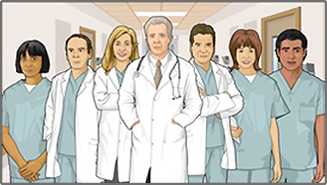- ACE inhibitors
- Angina - when you have chest pain
- Antiplatelet medicines - P2Y12 inhibitors
- Aspirin and heart disease
- Being active after a heart attack
- Being active after your heart attack
- Being active when you have heart disease
- Bile acid sequestrants for cholesterol
- Butter, margarine, and cooking oils
- Carotid artery stenosis - self-care
- Causes and risks for obesity in children
- Central venous catheter - dressing change
- Central venous catheter - flushing
- Cholesterol - drug treatment
- Cholesterol and lifestyle
- Cholesterol testing and results
- Choosing a skilled nursing and rehabilitation facility
- Clear liquid diet
- Closed suction drain with bulb
- Compression stockings
- Controlling your high blood pressure
- Cooking without salt
- Deciding to quit drinking alcohol
- Deep breathing after surgery
- Defining overweight and obesity in children
- Diabetes - preventing heart attack and stroke
- Dietary fats explained
- Eating habits and behaviors
- Eating out
- Exercise and activity - children
- Exercise and activity for weight loss
- Fast food tips
- Full liquid diet
- Getting out of bed after surgery
- Getting your home ready - after the hospital
- Getting yourself healthy before surgery
- Health risks of alcohol use
- Health risks of obesity
- Healthy grocery shopping
- Heart disease - risk factors
- Heart disease and depression
- Heart disease and intimacy
- Heart failure - fluids and diuretics
- Heart failure - home monitoring
- Hemovac drain
- High-fiber foods
- Home health care
- How to breathe when you are short of breath
- How to give a heparin shot
- How to read food labels
- How to take your wrist pulse
- Ischemic ulcers - self-care
- Leg or foot amputation - dressing change
- Living with a chronic illness - dealing with feelings
- Living with a chronic illness - reaching out to others
- Living with heart disease and angina
- Low-salt diet
- Managing your weight with healthy eating
- Mediterranean diet
- Oxygen safety
- Palliative care - fluid, food, and digestion
- Palliative care - managing pain
- Peripheral artery disease of the legs - self-care
- Peripherally inserted central catheter - dressing change
- Peripherally inserted central catheter - flushing
- Portion size
- Postural drainage
- Pulmonary hypertension - at home
- Screen time and children
- Simple, heart-smart substitutions
- Skilled nursing or rehabilitation facilities
- Skin flaps and grafts - self-care
- Smoking and surgery
- Snacks and sweetened drinks - children
- Snacks for adults
- Sterile technique
- Storing your medicines
- Stroke risk factors
- Supporting your child with weight loss
- Surgical wound care - closed
- Surgical wound care - open
- Taking medicine at home - create a routine
- Taking medicines - what to ask your provider
- Taking warfarin
- Taking your blood pressure at home
- Tests and visits before surgery
- The day of surgery for your child
- The day of your surgery - adult
- The night before your surgery
- The night before your surgery - children
- Using oxygen at home
- Varicose and other vein problems - self-care
- Venous ulcers - self-care
- Warning signs and symptoms of heart disease
- When you are drinking too much - tips for cutting back
Health exams for: #AGEGROUP#
The following exams, tests, and procedures are recommended for #AGEGROUPLOWER#.#FEMALETEXT#
Select a link from the list below to learn how and why each test is performed, as well how to prepare for it.
Exam
Frequency
The information provided herein should not be used during any medical emergency or for the diagnosis or treatment of any medical condition. A licensed medical professional should be consulted for diagnosis and treatment of any and all medical conditions. Links to other sites are provided for information only -- they do not constitute endorsements of those other sites. No warranty of any kind, either expressed or implied, is made as to the accuracy, reliability, timeliness, or correctness of any translations made by a third-party service of the information provided herein into any other language.
© 1997- A.D.A.M., a business unit of Ebix, Inc. Any duplication or distribution of the information contained herein is strictly prohibited.
© 1997- A.D.A.M., a business unit of Ebix, Inc. Any duplication or distribution of the information contained herein is strictly prohibited.
All content on this site including text, images, graphics, audio, video, data, metadata, and compilations is protected by copyright and other intellectual property laws. You may view the content for personal, noncommercial use. Any other use requires prior written consent from Ebix. You may not copy, reproduce, distribute, transmit, display, publish, reverse-engineer, adapt, modify, store beyond ordinary browser caching, index, mine, scrape, or create derivative works from this content. You may not use automated tools to access or extract content, including to create embeddings, vectors, datasets, or indexes for retrieval systems. Use of any content for training, fine-tuning, calibrating, testing, evaluating, or improving AI systems of any kind is prohibited without express written consent. This includes large language models, machine learning models, neural networks, generative systems, retrieval-augmented systems, and any software that ingests content to produce outputs. Any unauthorized use of the content including AI-related use is a violation of our rights and may result in legal action, damages, and statutory penalties to the fullest extent permitted by law. Ebix reserves the right to enforce its rights through legal, technological, and contractual measures.



